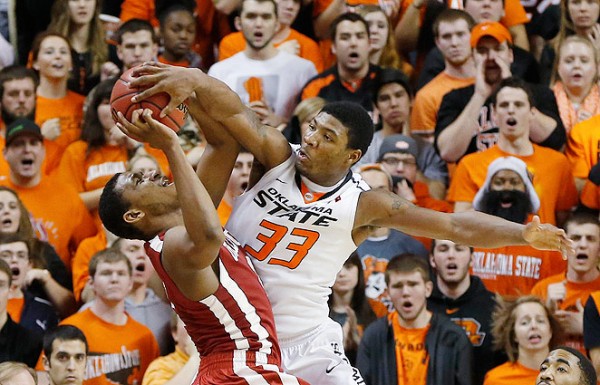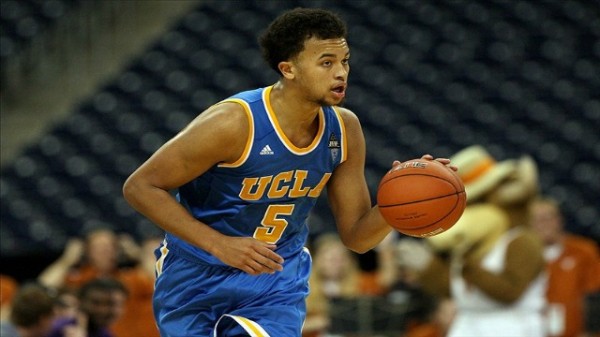The NBA Draft Is a Complicated Beast; Let’s Just Stay Out of It
Posted by Chris Johnson on April 18th, 2013Chris Johnson is an RTC Columnist. He can be reached @ChrisDJohnsonn.
Every year brings its share of puzzling NBA Draft decisions, and most of the frustration is typically captured by one underlying theme: he left too early. This year’s draft enigma was confusing for an entirely different reason. It was confusing because Marcus Smart, a consensus top-five pick in next month’s draft, elected to return to Oklahoma State for his sophomore season. The commentary on Smart’s decision has been a disconcerting mix of perplexity, misunderstood motives and an unexpected dose of condescending admonishment, with almost no reactive excitement – the best freshman in college basketball, and one of the best players overall, is returning next season, and no one has anything positive to say about it?! Isn’t this the exact development we spend countless words and digital ink groaning about each and every summer?!

No decision has generated more Buzz than Smart’s choice to play another year at Oklahoma State (AP Photo).
The early draft decision headlines have served as collective petri dish dissection of Smart’s purportedly misguided decision. But guess what? Other players are making very important decisions about their professional futures, too, and not all of them are as procedural and predictable and academic as Smart’s relative draft-media monopoly might lead you to believe. I’ll offer you two recent decisions (or non-decisions) that, while nothing close to Smart-level Big 12 rippling waves, will change the ways their respective teams are evaluated entering next season.
First up is James Michael McAdoo, who announced Tuesday he plans to return to North Carolina for his junior season. It’s difficult to fathom now, but McAdoo was once considered among the very best players in the country last summer. He was supposed to help bridge the gap between the Kendall Marshall-Tyler Zeller super team and a new and customarily talented re-tooled Tar Heels group. You probably didn’t hear much about McAdoo last season, for reasons good and not, but as UNC picked up steam in February and into March, and the true latent potential of Marcus Paige and P.J. Hairston began to turn a mediocre transition season into a legitimately scary Third Round proposition, North Carolina offered an entertaining preview of the high-win outfit it can and should rightfully become next season. McAdoo was a major collaborator in coach Williams’ midseason small-ball transformation – wherein UNC eschewed a traditional two-big lineup in favor of using McAdoo at the five and Hairston as a “power forward” – and UNC can rekindle that dynamic next season with a highly touted recruiting class, more experience and a better collective comprehension of the system. The upshot for McAdoo is more wins, a bigger national spotlight and another chance to round out his game for NBA scouts. Good deal.
Before you unleash a sarcastic comment about the obvious DUH that was McAdoo’s draft decision, I don’t disagree – staying another season makes the most absolute sense for McAdoo. I won’t make the same guarantee with UCLA’s Kyle Anderson; your mileage may vary. Not only is Anderson turning down NBA riches (Draft Express pegs him as the 27th pick in the 2014 draft, which says a lot more than the same numerical projection in the 2013 draft), he is returning to a new coach with an infamously stubborn insistence on halfcourt defense, and not a whole lot else. Or, to phrase it differently: Anderson shouldn’t expect his length and size and perceptive court vision to suddenly congeal and evince the offensive dynamism he so often failed to show on a consistent basis last season. Shabazz Muhammad is gone, and that will afford Anderson more touches, more opportunities to create, but if the cost-benefit analysis of turning down the professional ranks for another year of college is governed by likelihood of improvement and the possibility of changing (positively or negatively) one’s draft slot, I’m not so sure Anderson comes out on the positive side of that transaction.
But that’s just me, and Kyle Anderson is, you know, Kyle Anderson. And that right there might just be the most fundamentally flawed macro point about draft-decision analysis in general. Maybe Anderson just loves being a college kid, and maybe hanging out in 70 degrees with picturesque vistas and famously beautiful (and almost certainly interested) UCLA college girls and being treated like a high-ranking member of British Parliament 365 days a year isn’t such a bad lifestyle to live. Maybe McAdoo wants to really dig deep and channel the most enlightening aspects from last year’s promising lineup-change-induced finish and what incoming recruits Kennedy Meeks and Isaiah Hicks will add to make the Tar Heels into a legitimately scary outfit in a newly refurbished ACC. Maybe Smart isn’t satisfied with being the National Freshman of the Year, period, and is aiming for the bigger and more important age-agnostic distinction in his second season. Maybe financial calculus and foregone returns are fuzzy concepts that just don’t mean as much as getting every last ounce of amateurish joy out of a high-profile existence at some of the nation’s top college basketball programs. Maybe these are just three dudes who know the NBA, and all its financial security, are always going to be just one step away. The chance to compete and win, for university and friends and family, is a fleeting concept with a maximum shelf life of four years.
None of these three players are making the wrong decision. They are making the decision that makes the most sense in their warped dimensions of incipient hoops stardom, and who are we to debate the merits of their choices, to question the moral and financial underpinnings behind them? Objective commentary and detached analysis is standard practice with NBA Draft banter; it’s what sportswriters do. Self-righteous well-wishing and philosophical denunciations are out of line and completely out of touch. Before you assess the judgments of 20-year-old college athletes, think about taking a good, long, hard look at your own.













































